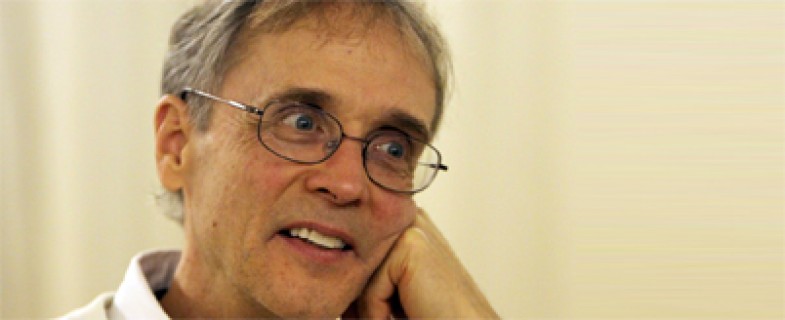COMMONS MAGAZINE

You would expect a Business School to focus its teaching on making profits from the world as it is instead of encouraging students to fundamentally change the world by studying the practice and potential of the commons.
But that means you haven’t met Notre Dame Business Professor Leo Burke — a former entrepreneur, Motorola executive and, in his student days at Notre Dame, manager of the football team. At first glance, Burke hardly seems a rabble-rouser. Wearing tassel loafers, navy blue slacks, a tasteful blazer and wire-rim glasses, he looks exactly the part of a business professor. Yet when standing at the podium in an Executive Leadership Seminar for MBA students at Notre Dame’s Mendoza College of Business, he sounds like a community organizer crossed with a moral philosopher. “When we are able to work out of our deepest values, we can work with a compassion for others that changes systems.”
“He’s sort of a sage—he really works on that level,” says Alexa Bradley,OTC Program Director, who has spoken to his MBA classes several times. He pushes the boundaries of a typical business class, she says, and equips his students “to seek solutions in a broader moral and community context.”
“The total inheritance of humankind upon which life depends,” is how Burke describes the commons. That’s from the website of the Global Commons Initiative, a project he’s launching out of the Mendoza School. But here’s the shorthand explanation he uses frequently in the classroom and conversation: “The commons means a world that works for everyone.”
Through the Global Commons Initiative, Burke has established both MBA and undergraduate courses in the commons at Notre Dame, launched an open-source commons curriculum available to everyone (now part of the London-based School of Commoning) and is working with the United Nations Institute for Training and Research on an “Introduction to the Global Commons”.
Burke notes that 20 years ago few B-schools offered classes in sustainability. Now almost all do. He predicts the same thing will happen with the commons, which today is the focus of courses in only a handful of universities and no other business programs that Burke is aware of.
He stresses the commons is not some abstruse theory — it’s part of the fabric of our daily lives. “What makes the commons come alive are human relationships — the dynamic interactions of people working together to address shared needs. You are actually participating in the commons, whether you know it or not, when you are volunteering at your local library, organizing a blood drive, doing a project with the Knights of Columbus or working with open source software.”
Still, a question remains: As important as the commons may be, why study it in a business school rather than in humanities or social science departments?
Dean Carolyn Woo, who encouraged Burke to create the Global Common Initiative before she left Notre Dame in December, reels off five answers to that question without stopping for a breath. 1) Understanding the global dimension of business is essential for anyone in the work world today; 2) Managing complex systems, including the interdependent relationships that characterize the commons, will be necessary for tomorrow’s leaders; 3) Safeguarding God’s creation is at the core of the Mendoza School’s purpose; 4) Paying attention to the commons promotes the school’s mission to ask more of business; 5) Giving students a wider view of the world on many levels will better prepare them for the future.
Indeed, official Catholic Catechism affirms the importance of the commons: “The right to private property, acquired or received in a just way, does not do away with the original gift of the earth to the whole of mankind” [No. 2403]. The commons, Burke notes, “is closely related to the ‘common good,’ a key concept in Catholic Social Teaching.”
But Burke finds evidence for the importance of the commons in many quarters. “The spiritual implications of quantum mechanics are remarkable,” he says. “What we are hearing from physicists is that all things are unified.”
At the heart of it, Burke says, the commons is about people connecting to make a better world. “I really try to listen closely to my students, and what I hear all of them say is that their families are most important in their lives. I hear them say they want to make a difference in their communities. But the way we work today, and the way our economy works, doesn’t always support that.
“There’s a huge gap between what we want for our children and grandchildren, and where we are headed right now as society,” adds Burke, who was awaiting the birth of his own first grandchild at the time we spoke. “The commons gives us new ways to bridge that gap.”
_—Jay Walljasper
This is adapted from a more detailed article appearing in Notre Dame magazine (Winter 2012). Reprinted by permission.